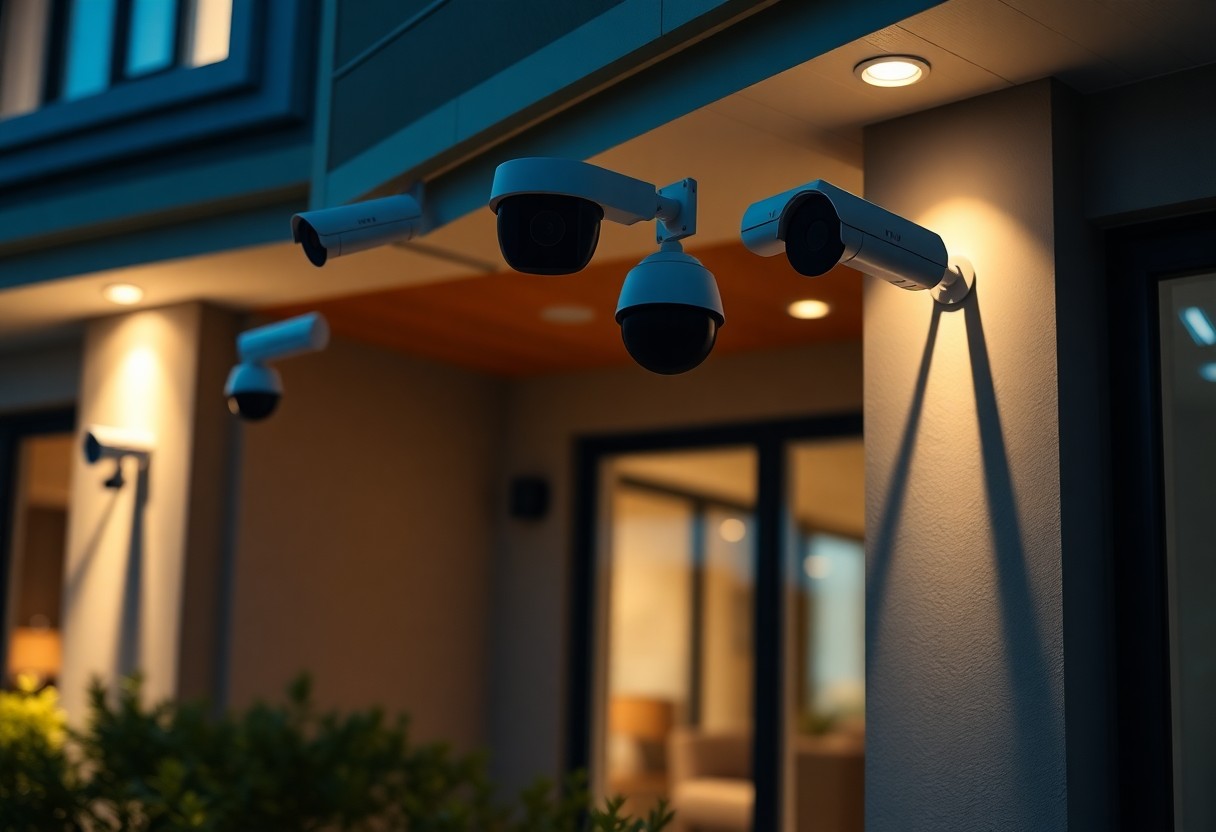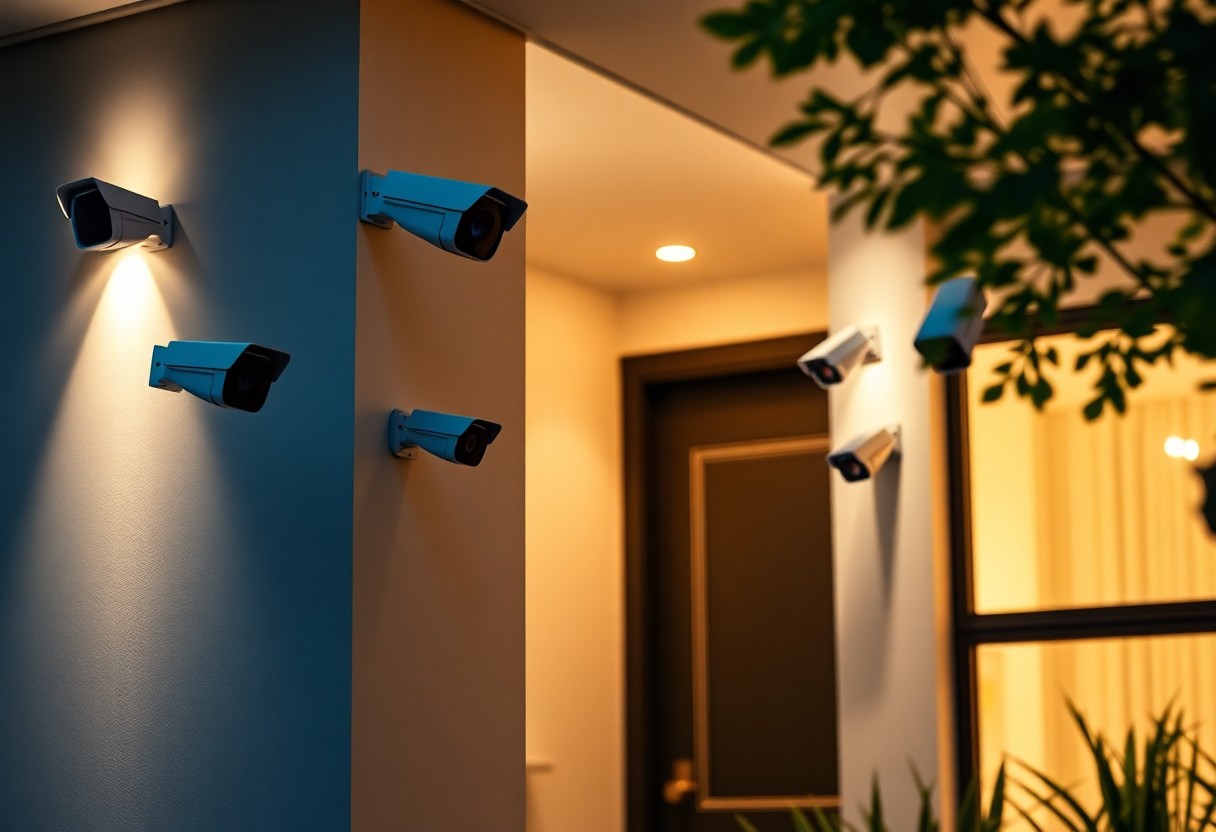Security in your home has evolved significantly, with cameras emerging as vital components of contemporary safety measures. As you consider enhancing your home’s protection, understanding the capabilities and limitations of security cameras is important. These devices not only deter potential intruders but also offer peace of mind by allowing you to monitor your property remotely. This blog post researchs into the role of security cameras as reliable guardians in your living space, exploring how they can effectively safeguard your home and enhance your overall sense of security.

Contents
- The Evolution of Security Cameras
- Historical Overview
- Technological Advancements
- Types of Security Cameras
- Wired vs. Wireless
- Indoor vs. Outdoor
- Benefits of Security Cameras
- Crime Deterrence
- Remote Monitoring
- Privacy Concerns
- Legal Implications
- Ethical Considerations
- Choosing the Right Security Camera
- Key Features to Consider
- Installation Options
- Future Trends in Security Cameras
- Integration with Smart Home Systems
- AI and Analytical Capabilities
- Conclusion
The Evolution of Security Cameras
For centuries, the concept of surveillance has evolved significantly, shaping the way you protect your home. The journey began with simple methods of guarding properties, but over time, technological innovations have transformed security into an crucial aspect of modern living. As you explore this evolution, you’ll find the remarkable developments that have made security cameras a trusted choice for safeguarding your domicile.
Historical Overview
With the invention of the first closed-circuit television (CCTV) system in 1942, security cameras began to emerge as powerful tools for monitoring and crime prevention. Initially used in military applications, their adoption spread to businesses and eventually households. Over the decades, these devices became increasingly sophisticated, evolving from bulky, monochrome cameras to compact models that could record in color. This historical journey highlights how you benefit from advanced security technology today.
Technological Advancements
Along with rapid advancements in technology, security cameras have transformed into smart devices that enhance your safety. Integrating features like high-definition video recording, night vision, and remote access via mobile apps empower you to monitor your home in real-time.
The rise of smart technology has introduced features such as motion detection, facial recognition, and cloud storage, allowing you to effortlessly store and access footage from anywhere. Wireless connectivity means you can easily set up cameras without extensive wiring, making it incredibly user-friendly. As you embrace these advancements, you can tailor your home security system to suit your lifestyle, ensuring peace of mind wherever you are. The synergy of these technological innovations enables you to stay one step ahead of potential threats to your home.
Types of Security Cameras
One of the most important things you need to consider is the variety of security cameras available. Each type has its own unique features and purposes:
- Bullet Cameras
- Dome Cameras
- PTZ Cameras
- Hidden Cameras
- Smart Cameras
Knowing these options will help you choose the right camera that fits your specific security needs.
| Type | Description |
|---|---|
| Bullet Cameras | Long and cylindrical shape, ideal for monitoring specific areas. |
| Dome Cameras | Compact and unobtrusive, suitable for indoor settings. |
| PTZ Cameras | Pan, tilt, and zoom capabilities for broad surveillance. |
| Hidden Cameras | Discreet cameras that go unnoticed to deter suspicious behavior. |
| Smart Cameras | Integration with mobile devices for remote monitoring. |
Wired vs. Wireless
With advancements in technology, you can choose between wired and wireless security cameras. Wired options generally offer more stability and uninterrupted power supply, while wireless cameras provide flexibility in placement without the need for extensive installation.
Indoor vs. Outdoor
To ensure comprehensive protection, you must select between indoor and outdoor cameras. Indoor cameras are designed to monitor the interior of your home, while outdoor cameras are built to withstand various weather conditions and monitor your property’s perimeter.
Due to their specific functions, indoor cameras often have features tailored to low-light environments and facial recognition, whereas outdoor cameras commonly include weatherproof housings and enhanced night vision. Each option plays an important role in providing you with complete security coverage, enabling you to deter potential threats effectively.

Benefits of Security Cameras
Some significant benefits of security cameras include enhanced safety, peace of mind, and evidence collection. By installing these systems, you not only protect your property but also foster a sense of security within your home and neighborhood. With advanced technology, security cameras can provide real-time alerts and detailed footage, making them an invaluable addition to modern domiciles.
Crime Deterrence
Along with peace of mind, security cameras serve as a powerful deterrent against criminal activities. When potential intruders notice cameras on your property, the risks of being recorded and apprehended often discourage them from proceeding with their plans. Consequently, you are sending a message to your community that your home is not an easy target.
Remote Monitoring
About enhancing home security, remote monitoring allows you to keep an eye on your property from virtually anywhere in the world. With the help of mobile apps and cloud-based technology, you can check live feeds, receive alerts, and even communicate through two-way audio systems—making security more accessible than ever.
Considering today’s fast-paced lifestyle, remote monitoring is an ideal solution for busy individuals. You can quickly access your security camera footage from your smartphone or tablet, whether at work, on vacation, or running errands. This flexibility ensures that you can stay informed about your property’s safety at all times, providing you with greater control and peace of mind.
Privacy Concerns
Unlike traditional home security methods, security cameras can inadvertently infringe upon the privacy of you and your visitors. You may find that surveillance technology captures more than intended, leading to discomfort or unease. Consider exploring solutions like Deep Sentinel: Security Camera Monitoring With Live Guards, which aims to strike a balance between security and privacy, providing peace of mind for homeowners.
Legal Implications
Around the world, different jurisdictions uphold various laws regarding surveillance and privacy. You need to ensure that your security camera setup complies with local regulations, including where cameras are placed and how footage is stored. Understanding these legal frameworks is crucial to avoid potential legal repercussions.
Ethical Considerations
For homeowners, the ethical implications of using security cameras extend beyond legal compliance. You must consider how your surveillance may affect the privacy of family members, guests, and even passersby. Striking the right balance between your security needs and others’ privacy is not only crucial for compliance but also for fostering trust within your community.
In fact, ethical considerations around home security cameras involve reflecting on the potential impacts on relationships and community trust. When you install cameras, it’s important to be transparent about their purpose and placement, ensuring that those within your space are informed and comfortable. You should contemplate creating a clear policy regarding the use of footage to build respect and empathy in interactions with others.
Choosing the Right Security Camera
Many factors come into play when you decide on the right security camera for your home. Your choice will depend on your security needs, budget, and the camera’s specific features. By assessing your premises and understanding your priorities, you can select a camera system that enhances your home’s security and provides peace of mind.
Key Features to Consider
An informed choice involves examining key features that cater to your specific requirements:
- Resolution: Higher resolution provides clearer images.
- Field of View: A wider angle captures more area.
- Night Vision: Essential for low-light conditions.
- Two-Way Audio: Enables communication through the camera.
- Storage Options: Choose between cloud and local storage.
- Motion Detection: Alerts you to unexpected movements.
- Weatherproofing: Protects devices from the elements.
This comprehensive list will guide you in choosing a security camera that effectively meets your home security needs.
Installation Options
Beside features, the installation options for your security camera also matter. You can opt for wired or wireless systems depending on your home’s layout and your preferences for ease of installation. Wireless systems typically require less setup effort, while wired systems can provide more stable connections.
In addition, you may consider whether you want a DIY installation or prefer professional assistance. DIY installations are usually more cost-effective and allow for quick deployment. However, if you’re not technically inclined, hiring a professional can ensure optimal camera placement and connectivity, maximizing your security effectiveness.
Future Trends in Security Cameras
Despite the rapidly evolving nature of technology, security cameras are becoming even more sophisticated. New advancements are set to enhance their functionality, providing you with unparalleled monitoring capabilities. These improvements range from higher resolution imagery to improved connectivity, ensuring that your home security system remains effective against emerging threats.
Integration with Smart Home Systems
Beside standalone functionality, modern security cameras are being designed for seamless integration with smart home systems. This integration allows you to monitor your property through a centralized hub, effortlessly controlling all your devices from one application. Increased coordination with other smart devices enhances your ability to respond to security incidents in real-time.
AI and Analytical Capabilities
Above all, advancements in artificial intelligence are transforming how security cameras operate. The ability to analyze video feeds in real-time means that potential threats can be recognized faster than ever, giving you the power to take action swiftly.
In fact, these AI-driven systems can differentiate between normal activities and suspicious behavior, notifying you of irregularities instantly. With features like facial recognition, people counting, and anomaly detection, you gain deeper insights into what’s happening around your property. This proactive approach ensures that your home security is not just reactive but anticipatory, tailoring alerts and responses specifically to your needs.
Conclusion
Hence, as you evaluate the integration of security cameras into your home, it’s clear that they serve as a formidable layer of protection in today’s world. These devices not only deter criminal activity but also enhance your ability to monitor your property in real-time, providing peace of mind. By adopting this technology, you empower yourself to respond swiftly to potential threats, fostering a safer environment for you and your loved ones.

Leave a Reply